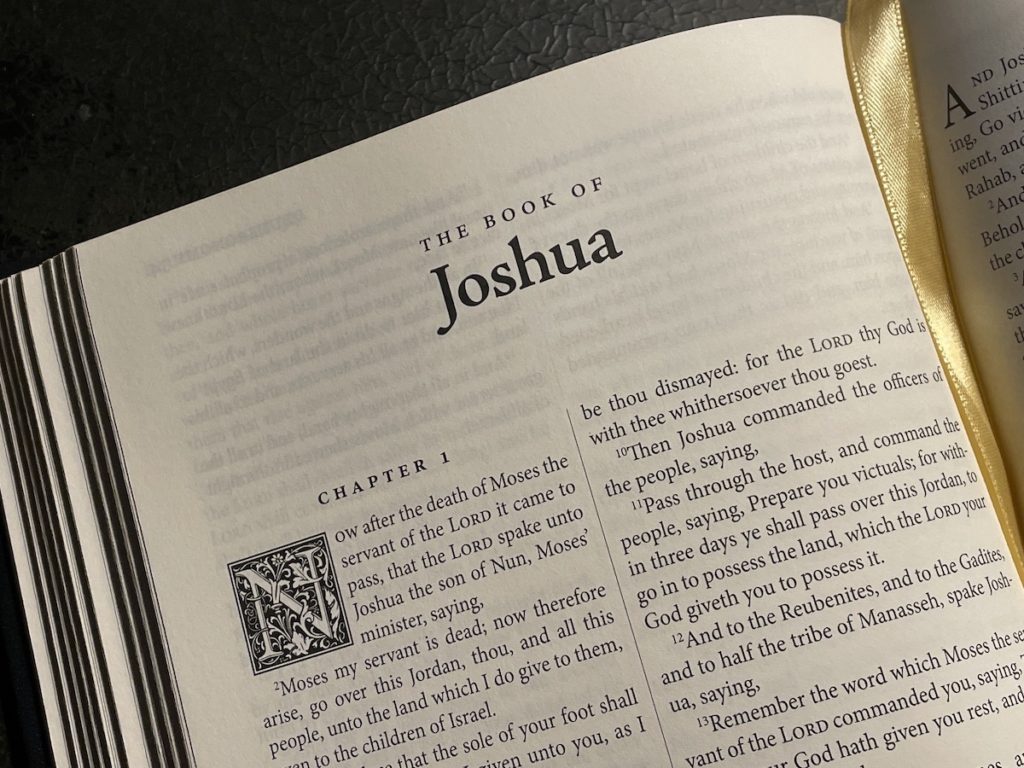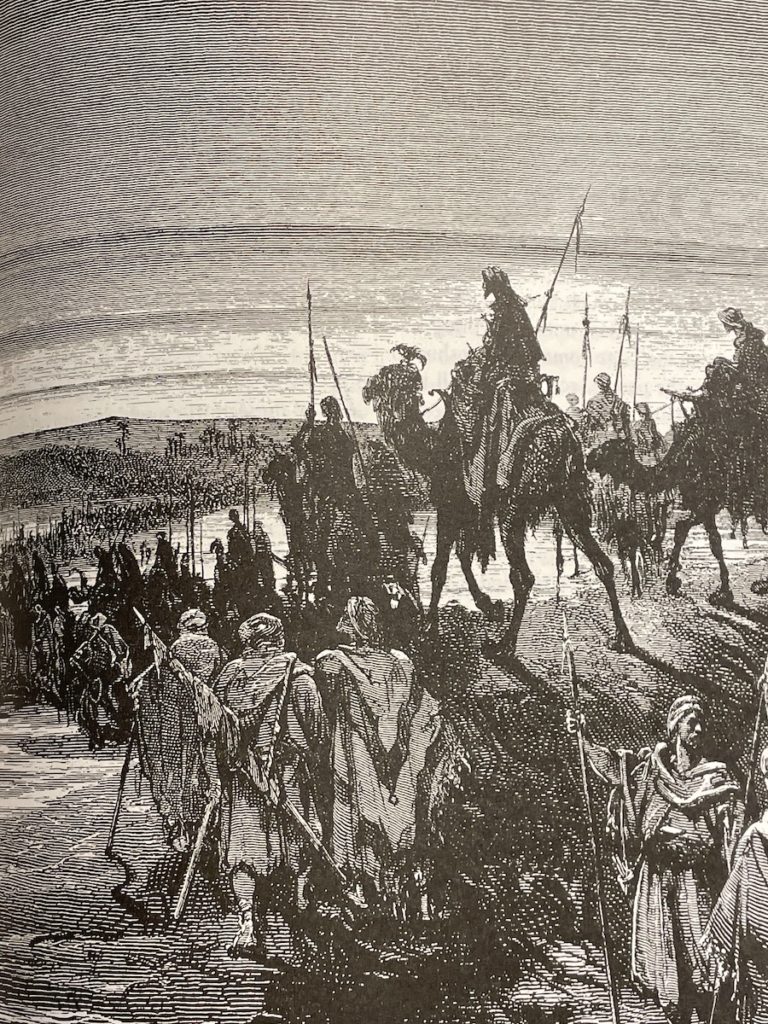
Joshua 1
Joshua 1:21–18, A New Leader; A New Beginning
The children of Israel have come to the end of their forty year wilderness journey. Now YHVH’s people must go forward in possessing the land and the inheritance that he has for them. This is a new beginning for the Israelites. They must go forth and carry with them into the Promised Land YHVH’s teachings or instructions in righteousness—the Torah—as well as the lessons they have learned in their wilderness experience. This principle applies to us as much as it did to the ancient Israelites, for as Paul said, “these things happened to them for examples [or types] and they are written for our admonition upon whom the ends of the world [or ages] are come” (1 Cor 10:11).

The saga of YHVH dealing with Israel did not end with the death of Moses. Similarly, the life of a believer does not start and end at the work of Yeshua at his first coming (whom Moses foreshadowed, see Deut 18:15–18). No, as the death of Moses signaled a new beginning for Israel, so Yeshua’s death on the cross marks a new beginning for redeemed believers as they make their way into their spiritual Promised Land. As Joshua (in Hebrew, Yehoshua meaning “YHVH saves”) led Israel into their physical Promised Land, so Yeshua (the Hebrew word for salvation) at his second coming will lead the saints into the “Promised Land” of his millennial kingdom, and then eventually into the spiritual kingdom of the New Heaven and Earth and the New Jerusalem 1000 years later. Read Hebrews chapters three and four for insights and understanding into how Moses and Joshua were prophetic shadow pictures of Yeshua at his two advents.
Joshua 1:1, Joshua … Moses’ servant. For how long was Joshua Moses’ servant before he became the leader of Israel? What does this teach us about YHVH’s discipleship program? How many other servants of YHVH’s does Scripture reveal spent years in training for the ultimate mission YHVH had for them as leaders of his people? How long was Joseph, Moses, Samuel, David, the disciples of Yeshua and Paul in training, to name a few, before YHVH was ready to use them for his special purposes? As Matthew Henry says in his commentary on this verse, “Those are fittest to rule, who have learned to obey.”
Joshua 1:6, 7, 9, 18, Be strong and of a good courage. Four times in the first chapter YHVH encourages the Israelites with this phrase. Why the fourfold repetition of this admonition at this juncture in Israel’s sojourn? Be strong is the Hebrew word chazak/קזח meaning “to strengthen, prevail, harden, be strong, become strong, be courageous, be firm, grow firm, and be resolute.”According to The Theological Wordbook of the Old Testament, the majority of times chazak is used in Scripture it refers to “being strong in battle.”This word can also mean “to harden one’s heart”against YHVH’s purposes as was the case with Pharaoh twelve times between Exodus chapters 4 and 14. Good courage is the Hebrew word amats/ץמא meaning “to be strong, alert, courageous, brave, stout, bold, solid, hard.”The aspect of this word that means “to harden one’s heart” can have both a good and bad connotation. One can harden or secure one’s heart with the resolve to obey YHVH, or contrariwise, choose to disobey him with an obstinate heart as well. Examples in Scripture where amats is used in the negative sense are Deuteronomy 2:30 and Amos 2:14. These two words, chazak and amats almost appear to be synonyms. Why would YHVH use two words with only slight variation in meaning in admonishing the Israelites as they were about to enter the Promised Land? Was he trying to emphasize a point? Perhaps he anticipated that eventually they would grow faint and weary battling the onslaught of evil around them and succumb to the influences of the surrounding pagan nations leading to their apostasy. Perhaps the writer of the Epistle to the Hebrews had these two Hebrew words in mind when he wrote the following:
12 Take heed, brethren, lest there be in any of you an evil heart of unbelief, in departing from the living Elohim. 13 But exhort one another daily, while it is called today; lest any of you be hardened through the deceitfulness of sin. 14 For we are made partakers of Messiah, if we hold the beginning of our confidence steadfast unto the end; 15 While it is said, “Today if you will hear his voice, harden not your hearts, as in the provocation.” 16 For some, when they had heard, did provoke: howbeit not all that came out of Egypt by Moses. 17 But with whom was he grieved forty years? Was it not with them that had sinned, whose carcasses fell in the wilderness? 18 And to whom swore he that they should not enter into his rest, but to them that believed not? 19 So we see that they could not enter in because of unbelief. (Heb 3:12–19)

What can we learn from our ancient forefathers in this regard as we face the challenges of remaining faithful to YHVH in the midst of a crooked and perverse generation?
Joshua 1:8, Make your way prosperous…you shall have good [Heb. sakal] success.The expanded meaning of the word prosperous is literally “to press through, to break out”or “to accomplish satisfactorily what is intended” (according to The Theological Wordbook of the Old Testament). The TWOT continues, “Real prosperity results from the work of God in the life of one who seeks God with all his heart (2 Chr 31:21; Ps 1:3, vol. 2, p. 766). The word success literally means “understanding, prudence, good sense, insight, prosperity.” An alternate rendering of this last phrase of Joshua 1:8 reads, “Make your way successful, and then you will act wisely” (The ArtScroll Stone Edition Tanach).
But how is that prosperity and success achieved? The answer is to be found in the first part of verse eight where four keys to success are given. They are:
Continue reading
